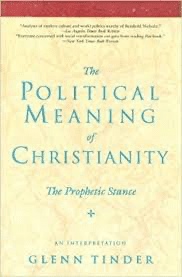The Political Meaning of Christianity: Chapter One, cont’d
Here, today, I will take up Chapter One, “The Fallen Individual” and “The Man-god versus the God-man” (pp. 35-52).
If you are reading the book with me, feel free to comment (following the guidelines below). If you are not reading the book with me, feel free to ask a question.
Why are we (I don’t know how many) reading and discussing this book? Because some of us believe Christianity has more than a merely private importance. We believe America and much of the West is rooted in Christian beliefs and values. But what are they and why do they matter? Author Glenn Tinder tells us, but without any hint of theocracy.
What Tinder is working toward is an explanation of his “prophetic stance” of true Christianity in the “public square.”
At the end of the previous section of this chapter, on page 34, Tinder said this about Christianity: “Christianity alone offers a world vision that commands absolutely the strange act of disregarding the natural limitations and moral defects so evident among human beings and treating every individual as noble.”
Here is the crux of the section titled “”The Fallen Individual”: “The truth, emphasized in Christianity, is that sin alters our entire situation; this is what is meant by fallenness. Sin is ironic. Its intention is self-exaltation; its result is self-debasement. In trying to ascend, we fall. The reason for this is not hard to understand. We are exalted by God; in declaring our independence from God, we cast ourselves down.” (39) So what are the practical, political consequences of this Christian emphasis on BOTH divinely granted exaltation (of the individual) AND “fallenness?” Tinder tell us on page 44 at the end of this section. The dual emphasis of Christianity on the exaltation and fallenness of all humans should bring (and has brought in the past) a “political balance” that “secular creeds find unattainable.” “It sets humane standards but rules out dreams of harmony without government and coercion.”
In the section entitled “The Man-god versus the God-man” Tinder criticizes the tendency of “the fallen individual” and secular society as a whole to either nihilism or idealism. His main foil here is Nietzsche whose philosophy he considers the inevitable outcome of a rejection of the Christian value and virtue of agape love. The moral is that “We cannot give up the Christian God—and the transcendence given other names in other faiths—and go on as before. We must give up Christian morality, too. If the God-man is an illusion, so is the immeasurable worth of every person.” (49) By “the God-man,” of course, he means Jesus Christ as the image or paradigm of humanity oriented towards God. (Yes, I believe Tinder did also believe in the incarnation, but for his purposes of explicating the political meaning of Christianity, one might say, as many have, that it is the image of the man devoted to agape love unconditionally that matters politically.)
Next week (God willing) I will take up the first two sections of Chapter Two: Prophetic Hope. They are: “Community and Society” and “The Ideal of the Just Society” (pp. 53-68)
Now for my response to these two sections of the book. I agree completely and whole-heartedly with Tinder, so far. Religion matters in public life. That is why Americans have never even come close to electing an atheist president, although I think that is likely to happen. Traditionally, Americans want their president to be a deist—at least in his or her public life. I believe part of President Jimmy Carter’s downfall was his very public Christian witness. Presidential candidate Michael Dukakis lost the election partly because he was to all appearances an unbeliever, a lapsed or excommunicated Orthodox Christian who showed no signs of being religious.
None of that means that Americans have cared much about our presidents’ morality in private life. What we have wanted and apparently still want is someone who believes in God and seems to be somehow or other “Christian” in the White House. Personally, I think the majority of American Christians lack discernment when it comes to judging candidates’ claims about being religious and especially Christian.
I do think religion matters. Would Americans vote for a candidate for president who is a devout adherent of a different religion than Christianity? As religion becomes increasingly privatized, yes, I think they increasingly will. The disconnect between religious beliefs and public life is growing and I don’t see any sign that it will stop or slow down. But where will that leave us? According to Tinder it could and probably will leave us without the moral compass of Christianity. What moral compass? Belief in the value and dignity of every individual human life and in the fallenness of all people—a paradox unique to Christianity and with political implications.
*Note: If you choose to comment, make sure you have read the book up to this point. If you have not, feel free to ask a question. In any case, keep your comment or question relatively brief (no more than 100 words), on topic, addressed to me, civil and respectful (not hostile or argumentative), and devoid of pictures or links.*














